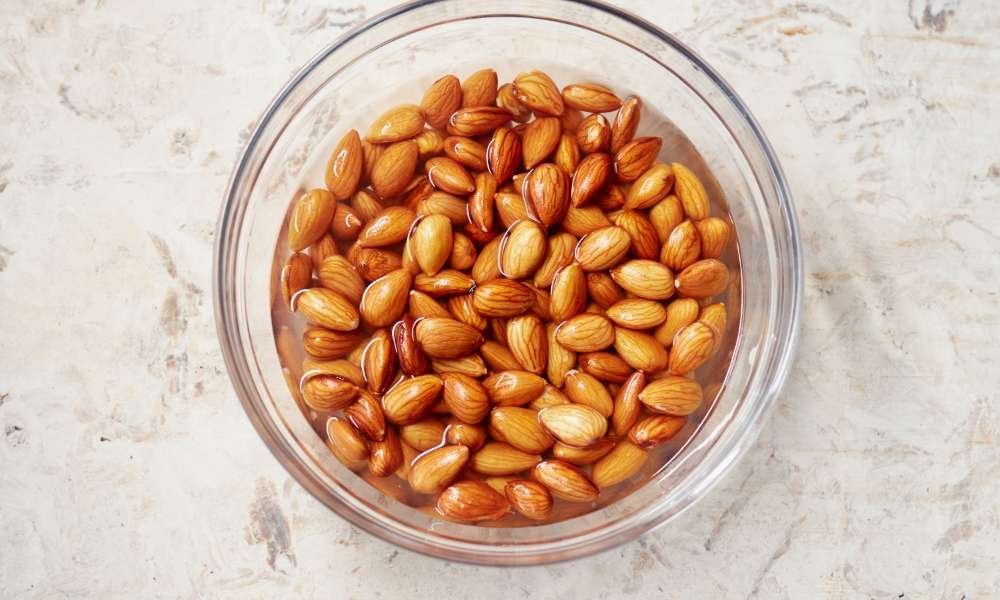My mom came to stay with me for a few weeks. She is one of those health conscious Indian moms who would go to any extent for her children’s health and happiness. As a part of that endeavour, she force feeds me 5 soaked almonds every morning on empty stomach. Almonds, I can eat. They are crunchy, mildy sweet and absolutely delicious when slightly toasted. They taste good in dry fruit smoothies too. But soaked almonds lack that crunch and tastes so bland that I simply detest it.
My mom, just like many others believe that soaked almonds are far superior to unsoaked ones. She says soaking gets rid of harmful compound called phytate which inhibits the body’s ability to absorb nutrients. Of course, this is something you must have read in many of the articles and WhatsApp forwards.
Of late, we have been doing a lot of posts based on evidences, studies and scientific researches. So I thought why not an article on benefits of soaked almonds. Afterall, if backed by science, even skeptics would follow and derive the magical benefits of soaked almonds.
And so we headed to research about the benefits of soaked almonds looking at various scientific journals and thesis. And here is what we found…
What Are Phytates?

Phytates or Phytic acids are a natural substance found in plant seeds. In cereals grains, phytate is found in the bran. It helps store phosphorous which is broken down when the seed sprouts. In nuts, phytates compose 0.17 to 9.42% of its dry weight, while in legumes, they range from 0.2 to 2.38%. In almonds, phytate makes up 0.35 to 9.42% of its dry weight. Yes, the range of variation is wide.
Phytate can prevent the body from absorbing minerals like zinc, iron, calcium etc. present in the food. This however doesn’t affect the body’s ability to absorb minerals from other meals of the day, unless your diet consists predominantly phytate-rich food. That being said, phytates are not without benefits either. They are an antioxidant and may protect against insulin resistance.
The common methods to reduce phytates are soaking legumes and cereals overnight, sprouting and fermentation.
Various studies have found that soaking, followed by cooking can reduce phytates in legumes and cereals. For example, it was found that soaking sorghum for 24 hours in room temperature reduced phytate by 16-21%. But this method also leads to loss of minerals and water extractable proteins from the legumes and cereals.
All these talks about the effect of soaking on legumes and grains. What is the effect of soaking on nuts? Let us explore.
What Does Science Say About Soaking Almonds Before Consuming Them?

Studies have been done to understand the effect of soaking in reducing phytates in almonds and hazelnuts. For the study, almonds and hazelnuts, chopped and unchopped, were soaked using three different methods. The first is almonds in plain water for 12 hours, then almonds in salt solution for 12 hours and almonds in salt solution for 4 hours. After this, phytates and mineral composition of the nuts were analysed using laboratory equipments.
It was found that soaking had no significant effect on reducing phytate content in almonds or hazel nuts. It did not significantly reduce the mineral content of the nuts either. However, phytate was reduced in chopped almonds that was soaked in water. But then, there was a significant decrease in minerals too, which kind of defeats the whole purpose of soaking.
Yet another study in the Eurpoean Journal of Nutrition too says that soaking almonds does not improve its gastrointestinal tolerance.
So What Are The Benefits Of Eating Soaked Almonds?

As you can see, the benefits of eating soaked almonds are pretty much the same as eating unsoaked ones. They are-
- Almonds help reduce cholesterol, especially in those with type 2 diabetes.
- Increases LDL and reduces risk of cardiovascular diseases.
- It is an excellent source of plant protein with 21% of almonds being protein.
- 100 gms of almonds contain 12 gm of dietary fibre. This has a positive effect on the digestive system and also decreases the risks of developing coronary heart disease and diabetes. It also helps increase satiety and reduce body weight.
- Almonds are a good source of Vitamin E which helps maintain healthy skin, hair and improves immunity.
- Being rich in riboflavin, it fights free radicals and reduces the damages they cause.
- Almonds are also a rich source of manganese, magnesium, copper, phosphorous and monosaturated fatty acids.
To conclude, almonds do have immense health benefits. Soaking or not soaking doesn’t make much of a difference in the benefits. Neither does it reduce phytates in almonds.
